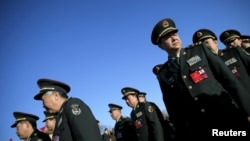China's plan to build military ties with Indonesia is not likely to bring any rapid changes to the two country's relationship, regional experts say. Over the long run, they say, Beijing may be seeking to build support for its claims over much of the South China Sea.
Chinese state news media have recently quoted China's Defense Minister Chang Wanquan, as saying that he hopes China and Indonesia will "deepen pragmatic exchanges and cooperation" on bilateral and multilateral issues.
But the move comes as tensions with neighboring nations over the disputed South China Sea continue to rise.
Carl Thayer, a professor emeritus at Australia’s National Defense Academy, says there have been two aspects of low-level cooperation between the two nations.
"There have been arm sales by China to Indonesia, radars and anti-ship missiles, and exchanges by ship forces annually, and exercises, mainly anti-terrorism drills, " Thayer said, "but involving not only the army but Indonesian special forces, and defense ministers have exchanged visits from time to time. The more recent focus from 2014 has been the cooperation of defense industries.”
The pledges of cooperation also may be an attempt to step down rising frustration in Jakarta over Chinese fishing trawlers sailing into Indonesian waters. The most recent incident was in March, when Indonesia attempted to detain a Chinese ship it said was fishing illegally near its coast.
Neutral role
While tensions have risen between Indonesia and China, Jakarta has so far played a neutral role in disputes between China and other countries over the South China Sea. China claims nearly the entire waterway, which is rich in natural resources and valuable fishing grounds. Indonesia has also pushed for implementation of the 2002 Declaration on the Conduct of Parties in the South China Sea (DOC).
Ian Storey, a senior fellow at the Institute of Southeast Asian Studies in Singapore, cautions that any deepening military ties between China and Indonesia will be largely symbolic, and dwarfed by both countries’ significant defense ties with other nations.
“All of the major ASEAN countries have made similar commitments, to strengthen their ties to China. It doesn’t always lead to concrete outcomes. Thailand has a very close defense relationship with China; Indonesia does not,” Storey said.
Indonesia already has strong military ties with the United States, and this week Indonesian media reported that talks have progressed with Russia for the purchase of advanced Russian defense equipment and the joint production of ammunition and arms. Currently Indonesia has just over 60 coastal patrol boats and two submarines.
Economic clout
Rahul Bajoria, an Indonesia economist with Barclays in Singapore, said despite rising tensions and a military build up in the region, China's economic clout will remain the most important factor in China Indonesia ties.
"There's been a general consensus with the ASEAN countries to focus more on economics when it comes to China, and I think, that is exactly what the Indonesians are doing as well," he said.
Cheng Xiaohe, a professor of international relations at China's Renmin University, says its in China's interest to build stronger military and economic ties with Indonesia.
“I think it’s very natural for China to increase its relationship with Indonesia. In the past years the two ties between the two countries have been the weakest link, so given the ongoing tensions in the South China Sea, if China can make ventures to increase ties it will send strong signals to Indonesia as well as the other states in the region,” Cheng said.
Last year China and Indonesia signed agreements for Chinese-built infrastructure projects, and Indonesia's president called on the two sides to raise bilateral trade to $150 billion by 2020.






